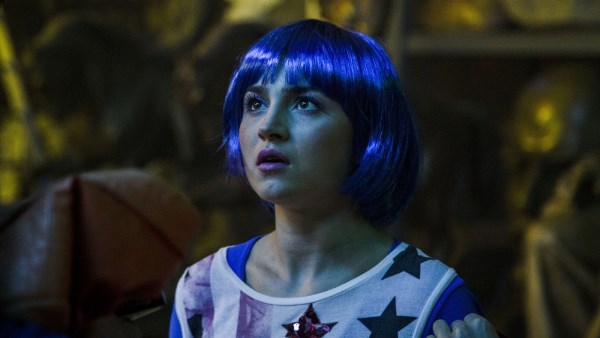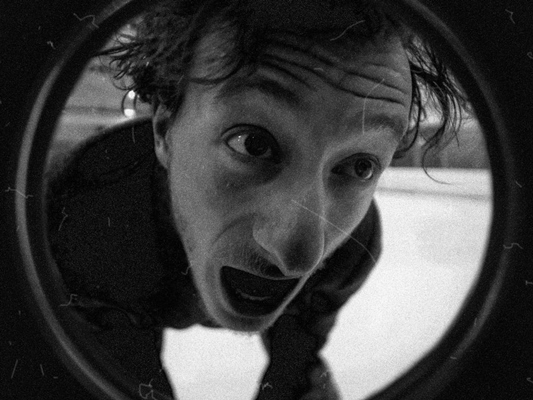Among my favorites from this year’s Slamdance Film Festival, which showcases the work of first-time independent filmmakers, were two feature films centering on outsiders. Though Slamdance 2019 recently concluded at Park City, Utah, you will likely get another chance to see them at other festivals this year.
The bleak but potent Crystal Swan, set in Belarus circa 1996, concerns an aspiring DJ, Velya (Alina Nasibullina), who seeks a way out of her stifling homeland. As a result of some unintentional fraud on her visa application, she must travel to a small factory town, more specifically, to the home of a working-class family whose phone number Velya wrongly used on the application. She asks the residents for a simple favor: When the government office calls to check up on her, can they pretend she is their employee? When the matriarch, to Velya’s surprise, refuses to help, she befriends the eldest son, Stepan (Ivan Mulin), a soon-to-be married ex-soldier. He agrees to let her wait in their kitchen by the phone.
Things become more complicated, however, beginning with Velya’s discovery that the family’s phone line has been disconnected, meaning she is stuck in town for several more days as service gets restored. Most fish-out-of-water tales involve visitors who are irrevocably changed for the better by their new and unfamiliar surroundings, but the longer that the blue-haired, iconoclastic Velya spends among these supposedly salt-of-the-earth people, the more she starts to see undercurrents of misogyny, selfishness, and cruelty all around her.
The film keeps one foot back in Minsk, the city that Velya came from, and where her nationalist mother (Svetlana Anikej) and Velya’s disaffected boyfriend (Yuriy Borisov) still reside, although neither lifts a finger to assist her. Director and co-writer Darya Zhuk set Crystal Swan at a time during which Belarus was facing an existential crisis following the Soviet Union’s dissolution, and there are parallels between it and Velya. Like her homeland, she has no old relationships to lean on while attempting to forge a new future for herself.
In the lead role, Nasibullina is terrific, combining steely determination with an iciness that makes Velya tough to warm up to at first. However, when she begins letting her guard down around the youngest member of the family, going so far as to lend him some of the electronica music she loves, it goes a ways toward softening her edges. In addition, Mulin and Anikej, who play the angry young man in town and the perpetually frowning mother back home, respectively, are excellent as individuals who present themselves as moral paradigms but who turn out to be hypocrites and opportunists in their own ways.
The director blends in moments of droll humor as the phone starts ringing at unexpected and impractical times. Then there are scenes that are just plain dark, such as one of surprising violence leading up to the final act, which thankfully, is handled tastefully without blunting its emotional impact. Ultimately, Crystal Swan feels like a poison-tipped letter from the filmmaker to her home country that is also an engrossing work of social criticism.
Arty and experimental, A Great Lamp features a trio of misfits that includes Max (Max Wilde), who is in his mid-20s and constantly prowling about the streets of a waterside city. He glues flyers of his late grandmother everywhere in hopes of keeping her memory alive—or maybe all of this activity is just to distract himself from his grief. Max isn’t the only person who has suffered a loss. He meets a drifter, Howie (Spencer Bang), who has been trying to drum up interest in a rocket launch supposedly happening in a few days. Recognizing something familiar in the other, the two become inseparable friends for a time, though Howie harbors a dark secret.
The film also tracks Gene (Steven Maier), who recently quit his soul-crushing job, but he hasn’t yet told his father, whose love and approval he craves. In order to perpetuate the ruse, Gene spends most of his waking hours wandering from place to place, though one regular hangout is a comedy club where his stand-up routine frequently falls flat. While the two story lines manage never to intersect, they share protagonists who long for simpler existences, specifically that of fish, whose brains are not evolved enough to experience disillusionment or conceive of death.
It’s heady stuff, but writer-director Saad Qureshi shoots and edits with a kind of punk-rock aesthetic in mind, which results in an energetic experience rather than an enervating one. Along with filling the frame with scratches that give the impression of the graininess of film, he frequently superimposes words and drawings, as if projecting the interior of the characters’ minds, hinting at what is most dear to them. This type of stylization could become tedious, but it never does, possibly because the world that the characters inhabit is already so whimsical that it fits in perfectly. Indeed, one of the most fanciful moments involves Howie fishing pennies out of a wishing well and teaching Max how to hear the wishes made by those who have tossed them in, but there are also internal monologues that segue into impressionistic animated sequences.
The whimsy effectively counterbalances the gritty black-and-white photography, which combined with Qureshi’s visual resourcefulness and focus on characters out on society’s fringes, at times evokes the early films of Alexandre Rockwell and Gus Van Sant. Despite how freely the sadness flows in A Great Lamp, the universe that its protagonists inhabit is a mostly genial one. For example, not a single person gives Max trouble about wearing a skirt. That the ending involves a smiling musical number featuring a song about the death of innocence seems par for the course; this is a movie that feels the weight of the world deeply yet retains a sense of hope.








Leave A Comment